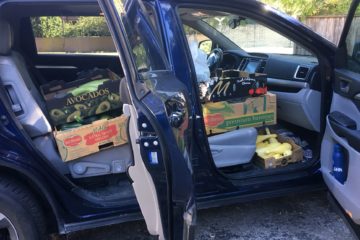Written by Anastasia Mathews, Nonprofit Management Intern
After more than two years of a global pandemic many of us have been left feeling isolated and lonely. A report published in 2021 showed that 36% of Americans struggled with “serious loneliness.” (Weissbourd, Batanova, Lovison, Torres) This isolation can have a negative effect on both our physical and mental well being. It is important to have a sense of connection to others and build up a community. At Each Green Corner, we believe food brings people together. This article will explain some ways that building healthy, community food systems will improve well being and benefit community members.
What is a Food System?
We consider a food system “to be the chain of activities connecting food production, procession, distribution, consumption, and waste management.” (American Planning Association) It’s everything that goes into making the food you eat and getting that food to your table. Food systems can vary in scales from local, community food systems, to large, international food systems.
A Healthy Food System is a Sustainable One
A healthy food system is one that’s going to be sustainable long-term. When considering sustainability, we want a food system to be able to produce enough for everyone to eat, improve environmental health and quality of life for all in society, as well as stay economically viable. (USDA 2011) This is easier to accomplish on a smaller scale, which is one reason to look at community based food systems. When describing a community food system, the UC Sustainable Agriculture Research & Education Program states “Farmers, consumers and communities partner to create a more locally based, self-reliant food economy.” (2013) These are local, smaller systems, that aim to have high community member participation.
Benefits of Community-Based Food Systems
The most basic benefit of a community based food system for community members is increased access to healthy, fresh produce. Since, there is less distance for the produce to travel, and a lower chance for the produce to go bad and be wasted. We’ve also seen an increase in supply chain issues over the course of the pandemic. When communities grow more of their own food, they will be less and less dependent on outside sources and such supply-chain issues. With local farms or community gardens, residents will have more control over what and how things are being grown. Local communities will also be able to produce more culturally appropriate foods and expanding the biodiversity of plants grown can be good for the soil health in addition to other environmental benefits of sourcing food more locally.
A major goal of community based food systems is to increase resident participation, this gets members more involved in their communities and can improve well being by doing so. (UCANR 2013) A major step to decrease loneliness and improve wellbeing is “working to restore our commitment to each other and the common good” (Weissbourd, et al. 2021). Doing things like volunteering for your local community garden and donating excess produce from your garden can increase your sense of belonging in your community and improve health-outcomes by improving food security. A Community-based food system provides a tangible route for change and widespread for a community.
Our Work at Each Green Corner
A large part of our mission at Each Green Corner is to build up sustainable, permaculture-based, community-involved food systems. Our Living Campus Program serves as education for students to get involved in agriculture at a young age. We donate produce from these and other sites to local food banks to help combat food insecurity in the area.
If you are interested in learning more about our work visit our Mission and Vision page. We are always looking for new volunteers, find out about upcoming volunteer opportunities through our calendar page or by emailing volunteer@eachgreencorner.org and subscribe to our newsletter!
Works Cited
Definitions: Sustainability and Food Systems. (n.d.). Retrieved March 21, 2022, from https://www.usda.gov/oce/sustainability/definitions
Doval, C. (2018, December 13). Community food system resources. Sustainable Agriculture Research & Education Program. https://sarep.ucdavis.edu/fs/assessment/community-food-system-resources
Food Systems. (n.d.). American Planning Association. Retrieved March 21, 2022, from https://www.planning.org/knowledgebase/food/
Weissbourd, R., Batanova, M., Lovison, V., & Torres, E. (n.d.). How the Pandemic Has Deepened an Epidemic of Loneliness and What We Can Do About It. 13.



0 Comments